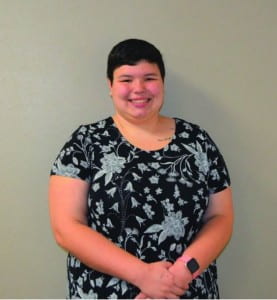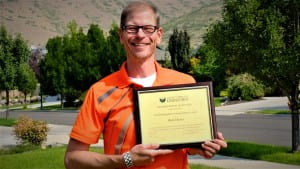View the print version of the Fall 2023 Nursing Newsletter
Rising Outcomes, Fall 2023 includes:
View the print version of the Fall 2023 Nursing Newsletter
Rising Outcomes, Fall 2023 includes:
Bay College, located in Escanaba in the beautiful Upper Peninsula of Michigan, has an opening for the Dean of Allied Health. The position primarily oversees the Nursing and EMT/Paramedic Programs. Following is the link to the position posting: baycollege.simplehire.com/applicants/Central?quickFind=51244
For more information, contact Beth Berube, Director of Human Resources at beth.berube@baycollege.edu or call 906-217-4036.
 Kayla Plucinski has been named UW-Green Bay Student of the Week. Kayla is a student in our NURSE 1-2-1 collaborative program with NWTC. She has taken on a student leadership role in our Counseling and Health Center and as a Resident Assistant (RA) in Residence Life. Kayla is truly making a difference for her fellow students!
Kayla Plucinski has been named UW-Green Bay Student of the Week. Kayla is a student in our NURSE 1-2-1 collaborative program with NWTC. She has taken on a student leadership role in our Counseling and Health Center and as a Resident Assistant (RA) in Residence Life. Kayla is truly making a difference for her fellow students!
Kayla, thanks for all you do for UW-Green Bay! Congratulations on being recognized as the Student of the Week!
Health Professionals Week is November 5-9th this year. The American Association of Colleges of Nursing will be hosting FREE online events everyday that week. These events will include a webinar with 2 keynote speakers, Twitter conversations about Healthcare and Politics, live chat rooms for students, teachers & advisors to discuss career opportunities and experiences with healthcare professionals and more! If you are interested in pursuing an education and career as a healthcare professional, this is a great opportunity!
For more information and how to register, click here: https://www.magnetmail.net/actions/email_web_version.cfm…
The City of Milwaukee is currently seeking the position of Public Health Nurse 1.
Salary: $53,044 annually for City of Milwaukee residents.
Mark Hunter is this year’s Distinguished Alumni Award recipient. Mark is a 2016 graduate of the national BSN-LINC online RN to BSN Program. Mark’s story is motivational.
Four years ago, Mark’s son fell and fractured his arm. Treatment included intravenous sedation and manipulation to align the bones. His son already had limited access options due to the fractured arm and an inexperienced nurse attempted to place his peripheral intravenous catheter (PIV). On the first try, she obtained a blood return and struggled to advance the cannula off the needle. Mark’s son screamed in pain. The needle found the vein, but the cannula did not. On the second attempt, she advanced the catheter too far, infiltrating the vein. On her third attempt, an experienced nurse came in and placed the PIV on the first try. Today, Mark’s son is not afraid of a potential break of one of his bones, but the placement of a PIV.
This experience motivated Mark to conduct research. He found upon admission to a hospital, 90% of patients receive intravenous therapy with 98% of the therapy delivered via PIVs. Unfortunately, initial placement of PIVs is only 57% successful with an average of two attempts required. Research demonstrates that initial placement success climbs to 95% among vascular access nurses with specific training related to assessment, placement, maintenance and removal. Further, it is well known that PIV placement is one of the top three skills graduate nurses are uncomfortable performing (Wenger, 2015). Another study by Clay and colleagues (2017) demonstrated that less than 10% of medical and nursing students could identify a PIV needing replacement.
Mark approached the Association for Vascular Access (AVA) and was given the opportunity to lead a task force to determine how nursing schools and health care institutions educate nursing students and practicing nurses about PIV concepts and skills. He reached out to Dr. Chris Vandenhouten for guidance and assistance. They completed a study with responses from over 700 nursing schools and healthcare institutions throughout Canada and the United States. The research resulted in the development of a comprehensive, evidenced based PIV curriculum and toolkit that AVA will offer. The article detailing the research has just been published in the September 2018 edition of The Journal of the Association for Vascular Access.
Congratulations to Mark and his commitment to the profession of nursing.
The University of Wisconsin-Green Bay received approval from the UW Board of Regents today (August 24, 2018) to move ahead in offering a prelicensure Bachelor of Science in Nursing (BSN) program, paving the way for students to begin in fall 2020. The program will expand UW-Green Bay’s ability to fulfill unmet student demand for a high-quality BSN degree at an affordable tuition cost. According to UW-Green Bay’s Susan Gallagher-Lepak, dean of the College of Health, Education and Social Welfare, the proposed program will complement the University’s existing nursing programs, including the accredited BSN Completion program (currently offered by UW-Green Bay, on campus, collaboratively with other UW institutions in Wisconsin via distance education, and nationally via distance methods), NURSE 1-2-1 program and graduate program in nursing (leadership focus).
“We’ve received many positive comments about this new program from employers of nurses, such as hospitals, insurance companies and public health agencies,” offered Gallagher-Lepak. “Leaders at healthcare organizations have indicated that they will make clinical spots available to UW-Green Bay nursing students.”
Strong Support and High Demand
The University is receiving strong support for this program from many constituent groups within the region, including the UW-Green Bay Chancellor’s Council of Trustees Program and Initiatives Advisory Committee. Leaders of healthcare organizations in the community strongly support this program as a means to increase the number of BSN-prepared nursing graduates in Wisconsin.
“Nursing is the largest workforce in healthcare,” affirms Paula Hafeman, Chief Nurse Executive, Hospital Sisters Health System-Eastern Wisconsin. “According to a 2016 Wisconsin Center for Nursing report, it is projected that we will need more than 20,000 new registered nurses each year in Wisconsin to meet healthcare needs. More than 26,000 Wisconsin nurses will retire in the next 10 years alone. When you consider the need, and fact that healthcare continues to increase in complexity with advanced technology, treatments and an aging population, more healthcare providers are necessary. Wisconsin graduates 3,000 nurses each year. We need to support increasing nursing programs throughout Wisconsin.”
Nursing Shortage is Statewide
Of the approximately 3,000 new nurses per year (Wisconsin Center for Nursing, 2015), 55% earn baccalaureate degrees and the remainder earn associate degrees. Employers are increasingly requiring nurses to have a BSN degree (versus an associate degree in nursing) in Wisconsin and nationally.
Student demand for a nursing program at UW-Green Bay, specifically, is very high. Approximately 300 students apply to UW-Green Bay as pre-nursing majors each year. Because UW-Green Bay, until now, did not offer a prelicensure BSN, potential new freshmen choose not to enroll at UW-Green Bay, and current students who want to pursue a nursing major transfer to public, private or technical nursing programs. Further, existing BSN programs within the UW System are unable to meet student demand. Approximately 50-80% of qualified applicants to baccalaureate nursing programs are denied admission to UW System Nursing Schools, primarily due to capacity issues (Young et al., 2016). This is consistent with national trends, according to the American Association of Colleges of Nursing (AACN).
Chair of Nursing and Associate Professor, Christine Vandenhouten, said the program would provide regional opportunities that haven’t previously existed. “While UW-Green Bay is well-positioned to support a prelicensure nursing program, we look forward to working with the outstanding liberal arts and science faculty, both on the Green Bay campus and also our new branch-campus partners in Marinette, Manitowoc and Sheboygan. We expect strong interest from students taking their pre-nursing courses at all four campuses prior to applying to the UW-Green Bay prelicensure program.”
Students can apply to UW-Green Bay in pre-nursing for fall 2019. The first cohort accepted into the prelicensure program will begin in fall 2020. Didactic, skills and clinical courses in the program will prepare students for entry-level professional nursing practice in various areas. Nurses work in a wide array of settings, including hospitals and long-term care facilities, clinics and outpatient facilities, community centers, homes (homecare), schools, camps and businesses.
We are pleased to announce BSN alumni, Mark Hunter and Dr. Chris Vandenhouten are co-authors of a research article – Addressing the Silence: A need for Peripheral Intravenous Education in North America. The article, to be published in September, 2018 edition of The Journal of the Association for Vascular Access, is available in final version at: https://authors.elsevier.com/c/1Xbgq5X5TLiVDh
The article is available for reading or downloading with no registration fees.
Dr. Christine Vandenhouten, pictured here with Chancellor Gary Miller, was recognized as the recipient of the Founders Award for Excellence in Community Outreach as the University of Wisconsin-Green Bay community gathered for the Fall Convocation today marking the beginning of the 2018-2019 academic year.
Dr. Vandenhouten’s community service has been extensive and exemplary. A sampling of her involvements include:
Earlier this year, Dr. Vandenhouten was recognized with the Brown County United Way Community Impact Award.
Congratulations on receiving this most deserved recognition!
Congratulations to Dr. Brenda Tyczkowski on receiving tenure and being promoted to Associate Professor by the University of Wisconsin Board of Regents during their June 8, 2018 meeting. Dr. Tyczkowski is on the Nursing & Health Studies faculty and is the Academic Director of the Health Information Management & Technology Program. She has been on the UW-Green Bay faculty since 2008 and has over 35 years of experience in the field of nursing and health care.